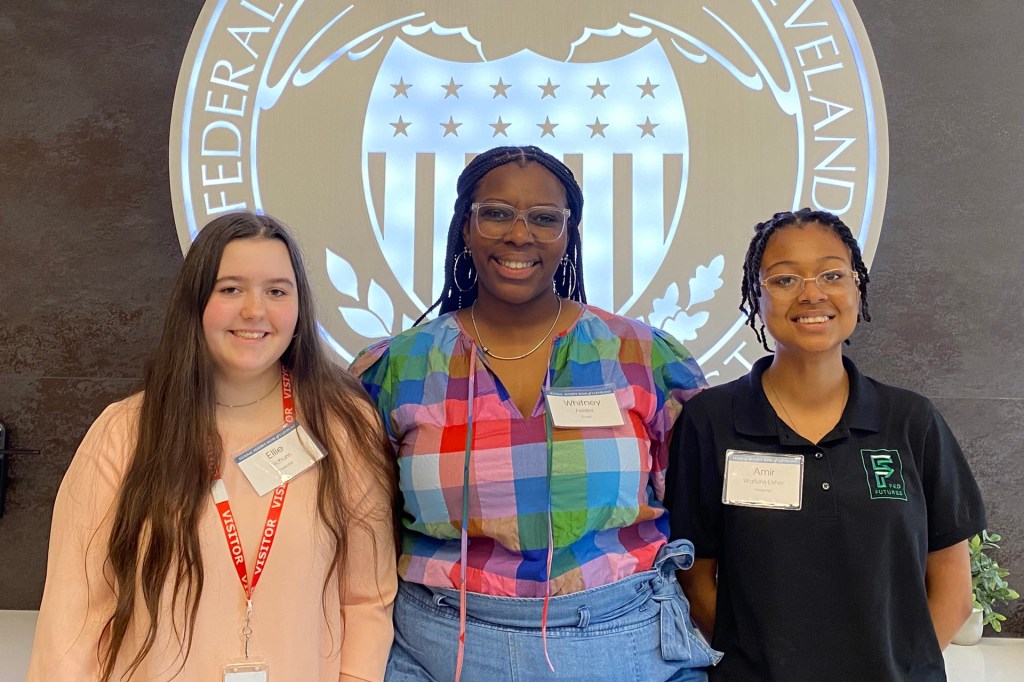Top photo: Ellie Flinchum (Fed Futures intern), Whitney Felder (Fed Communities), and Amir Watkins-Usher (Fed Futures intern) stand in front of the seal of the Federal Reserve Bank of Cleveland. July 2023.
Recently, Fed Communities had the opportunity to host two FED Futures scholars. FED Futures, a program created by the Cleveland Fed, is dedicated to helping high school students develop skills that will help them achieve their career goals, uncover their professional interests, and expand their professional networks. Amir Watkins-Usher, a rising senior at South High School in Columbus, Ohio, and Ellie Flinchum, a rising senior at Campbell County High School in Northern Kentucky, have participated in FED Futures for almost 2 years.
Most recently, Amir and Ellie spent time with the Fed Communities team and guest authored this blog. Find out what they uncovered in an interview with Amir’s dad, a Columbus entrepreneur, and how these insights reflect some findings from the 2023 Report on Nonemployer Firms: Findings from the 2022 Small Business Credit Survey.
Overall, the Small Business Credit Survey provides helpful insights on firms in different stages of the business life cycle—from small startup nonemployer firms to well-established employer businesses. The 2023 Report on Nonemployer Firms focuses on nonemployer businesses, or those that employ only the firm owner or owners, and explores the differences between younger and older firms and between nonemployer and employer businesses.
With great power comes great responsibility
“I’ve always wanted to be my own boss,” said Charles Usher, Columbus native and owner of a local lawn care business. The company specializes in planting, mulching, and landscaping. Charles says he’s always dreamt of owning a business. Like many small business owners, Charles credits wanting to “do for myself and be on my own” as one of the main inspirations for becoming an entrepreneur. He has successfully run his business for the past nine years but shares it hasn’t come without challenges. In his opinion, running his own business is more challenging than working a traditional nine-to-five job. “Much more challenging,” Charles said. “You’re responsible for everything!”
Another challenge he shares is the evolution of his clientele. “The customer has changed. They have different demands now,” Usher mentions. When he first started his business in 2014, it seemed that money was a little easier to come by for his clients compared to now. In the past, clients were willing to book landscaping services more often and would often add on additional services. Things have since changed, especially after the COVID-19 pandemic. Lately it’s been harder for Charles to secure payments from clients, likely due to the rising cost of living and inflation.


The fuel that funds the dream
Small business owners often struggle in the beginning to secure funding to start up. According to the 2023 Report on Nonemployer Firms, 76% of nonemployer startups and 80% of employer startups use the owner’s personal savings as a funding source. Charles shares that he used his personal money to start his business. But he now believes that a business loan may have been easier. Utilizing a loan and keeping his personal savings may have saved him from having to make sacrifices at home. Like many small business owners, Charles shares that he and his family had to make sacrifices just to get the business off the ground and going. Sacrifices and decisions around funding often create stressful situations for small business owners because they personally have so much at stake. Charles said, “as a business owner you don’t want to lack anywhere, but especially at home. The people at home are the ones really rooting for you. You don’t want to let anyone down.”
“As a business owner you don’t want to lack anywhere, but especially at home. The people at home are the ones really rooting for you. You don’t want to let anyone down.” – Charles Usher, landscaping business owner
Currently, Charles considers operating costs as one of his biggest financial challenges. “The cost of gas is another challenge. My company basically relies on fuel and oil, and they have doubled in price.” According to the 2023 Firms in Focus chartbook on owner race and ethnicity, Charles is not the only small business owner struggling with these costs. Per the chartbook, 71% of Black-owned businesses have trouble paying for operating costs.
Support for local businesses can be free
The Small Business Credit Survey states that 63% of Black-owned businesses also have trouble reaching new customers. So how can people support Black-owned businesses? “Support alone is just telling somebody else about a local small business. If you don’t have the money to buy something or spend with that business, refer a friend.” Charles has benefited from referrals and sees that as a way that others can support local businesses. “I’ve really been blessed [with new customers] by word-of-mouth.” These days, many of his new customers find out about his business through referrals from former customers or people who know about his business.
Charles encourages people to spend money in their community. Small businesses are important to the economy, and communities thrive when small and local businesses are supported. He encourages people to be patient and have grace when supporting small businesses. “Entrepreneurship for many people, especially Black people in the community, is new,” he says. “People are still finding their way while navigating all the challenges of being a first-time business owner,” Charles adds.
Despite the challenges that come with starting a business, it is still a rewarding journey. Charles is heading into year 10 of operating, a significant milestone for any small business owner. Although Charles is navigating challenges, the reward of living his entrepreneurial dream servicing his clients and community keeps him going.
For more insights about the challenges small business owners are navigating, check out the suite of Small Business Credit Survey reports.
More ON Small Business











